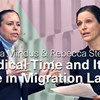citizenship
Rainer Bauböck: Globalization, new technologies and the future of democratic citizenship
Professor of Social and Political Theory, European University Institute. ABSTRACT Liberal democratic citizenship has been shaped by the legacies of Athens (democracy) and Rome (legal rights) but operate between individuals and states. In a Westphalian world, citizenship has both instrumental and identity value. Enhanced opportunities and interests in mobility rights strengthen instrumental interests in multiple citizenship among immigrants, among populations in less developed countries, and among wealthy elites. The latter two trends potentially undermine a genuine link norm and, if they prevail, might replace the Westphalian allocation of citizenship with a global market. New digital technologies create a second challenge to Westphalian citizenship. As has argued, digital identities could provide a global legal persona for all human beings independently of their nationality, and blockchain technologies could enable the formation of non-territorial political communities providing governance services to their members independently of states. Both the instrumental uses of citizenship for geographic mobility and technologies that create substitutes for territorial citizenship are not merely relevant as current trends. They are also advocated and defended normatively as responses to the global injustice of the birthright lottery. I will challenge this idea and argue that liberal democracies should not be conceived as voluntary associations whose membership is freely chosen, but as communities of destiny among people who have been thrown together by history and their circumstances of life. How these foundations of democratic community can be maintained in the context of rising mobility and the digital revolution remains an open question.
Education and Citizenship in the Knowledge Society – Towards the Comparative Study of National Systems of Education
This paper proposes that education systems can be studied in relation to the welfare state and knowledge society in the global age through discussing the aims of education in relation to core values o

Status and stability. An examination of the importance of time in Swedish asylum and citizenship legislation
The past years the migration laws have shifted from the permanent to the temporary. What does the aspect of time mean for the individual's legal status?
David Owen: Refugees, EU Citizenship and the Common European Asylum System: A normative dilemma for EU Integration.
David Owen, Professor of Social & Political Philosophy, University of Southampton. Abstract This article argues that the practical difficulties and normative dilemmas at stake in the European refuge
Artificial Intelligence, Datafication and Exploring the Minimum Content of Nationality
The Statelessness & Citizenship Review, 6(1), 124-129 COMMENTARY: Introduction Identifying the minimum content of nationality (‘MCN’), the inalienable core elements or conditions of citizenship witho

Rebecca Thorburn Stern
I am Professor of Public International Law at Uppsala University. My research focuses on migration, particularly asylum, human rights, and the relationship between international and national law. At ths on the project which explores the significance of time in Swedish asylum and citizenship law over the past 25 years. The project combines public international law, legal philosophy, migration law and citizenship law and migration studies. We investigate how time is used as a tool to control and govern migration and how time can affect stability and predictability of legal status.
Patricia Mindus and Rebecca Stern: Juridical Time and Its Role in Migration Law - A Focus on Sweden
Venue: Holländargatan 13, Stockholm, or online. Research seminar with Patricia Mindus and Rebecca Stern. Patricia Mindus is Professor in Practical Philosophy at Uppsala University. Her research mainly f

Patricia Mindus and Rebecca Stern: Juridical Time and Its Role in Migration Law
In Sweden and other countries, a clear trend in migration law in recent years has been a shift from permanent towards temporary: time-limited residence permits, revocation of refugee status, higher th
EU Citizens - Thirty years on. An introduction
Nordisk Socialrättslig Tidskrift/Nordic Social Law Journal 38.2024 Patricia Mindus & Anna-Sara Lind (eds.) Abstract 2023 marked thirty years since European Union citizenship was introduced as the Trea
Remittances from Sweden – an Exploration of Swedish Survey Data
The present study explores data on transfers of gifts/economic support to relatives, and analyses these in relation to different kinds of income, education, age, time since migration, acquisition of c








